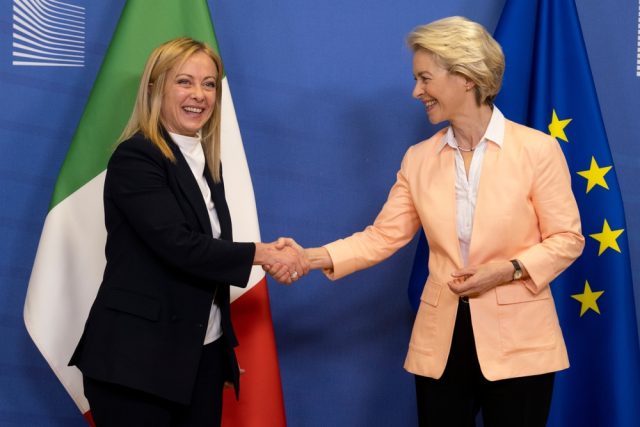
Efforts with Trump Raise Hope for a US-EU Summit
Giorgia Meloni is carving out a leading role for herself on the international geopolitical chessboard. The latest confirmation comes directly from the highest echelons of the European Union, which – according to the Financial Times – have “positively” welcomed the Italian Prime Minister’s efforts to build a bridge of dialogue between Brussels and Donald Trump. An effort that could prove decisive for the convening of an official summit between the United States and the European Union, thanks to Meloni’s mediation.
Meloni, Trump and the diplomacy of dialogue
The recent bilateral meeting between Meloni and Trump at the White House had a far from negligible outcome. During the meeting, the former American president openly praised the Italian Prime Minister, calling her “a great person”, and referred to the possibility of a trade agreement between the two sides of the Atlantic, to be reached “100%”. Words that did not go unnoticed in Brussels, where several European officials expressed appreciation for the diplomatic approach of the leader of the Brothers of Italy.
The crux of the matter concerns Trump’s return to the international scene and his traditional preference for bilateral relations, rather than multilateral dynamics. In this context, Meloni’s figure takes on a strategic value: as the Financial Times points out, Brussels hopes that she can act as a bridge between the American leader and the European institutions, facilitating the organization of a US-EU summit.
The EU’s support: words and deeds
According to reports, the Italian Prime Minister had already discussed the possibility of a summit with António Costa, current President of the European Council, who assessed the proposal “positively”. European Commission officials also expressed their support, highlighting the importance of transatlantic dialogue in a delicate phase such as the current one, marked by geopolitical instability, trade tensions and the upcoming deadline for the suspension of customs duties scheduled for July 8.
A European official, again quoted by the Financial Times, confirmed that “Italian counterparts have shared with us detailed information on the meeting between Prime Minister Meloni and President Trump”, including discussions on a possible institutional summit. This climate of openness, between Rome and Brussels, represents a significant reversal of the trend compared to the first months of Meloni’s government, characterized by a certain skepticism in the European context.
Strategic opportunities: from Rome to The Hague
The international calendar could offer crucial opportunities to give substance to these signs of openness. Trump has already announced that he will attend the funeral of Pope Francis in Rome, an event that could turn into a moment of informal discussion with European leaders. In addition, the NATO leaders’ summit is scheduled for June in the Netherlands, an event at which Trump is expected to be present. A visit that could also include meetings with representatives of European institutions, taking advantage of the geographical and temporal proximity of the event.
The President of the European Commission, Ursula von der Leyen, stressed in a recent interview that “a good time to meet Trump would be when we have reached a good trade agreement”. The reference is clear: Europe is looking carefully at the expiry of duties and a possible new balance in economic relations with Washington. In this scenario, Meloni’s diplomatic leadership could make the difference.
Meloni between internal consensus and external recognition
The appreciation expressed by Brussels is not only a recognition of the Prime Minister’s diplomatic skills, but also a political message addressed within the Union. At a time when ideological fractures and strategic divergences threaten European cohesion, the fact that an Italian conservative leader manages to obtain the applause of the Commission and the European Council is far from a given.
In Italy, the news has provoked mixed reactions: on the one hand, Meloni’s supporters see these words as a legitimation of her foreign policy, while on the other, the left continues to question the solidity of the axis with Trump and the real impact of these meetings. However, despite the controversy, it seems clear that Europe is starting to consider Meloni not only as a figure of weight at the national level, but also as an actor capable of influencing major global balances. The “official” promotion received by Meloni from European leaders marks a new chapter in Italian foreign policy. In an increasingly fluid international context, the ability to mediate, dialogue and build bridges – even with polarizing figures like Donald Trump – can represent a precious resource. If the goal is to relaunch the transatlantic dialogue and protect European interests, Italy, with Giorgia Meloni at the helm, seems destined to play an increasingly central role.



 Subscribe
Subscribe